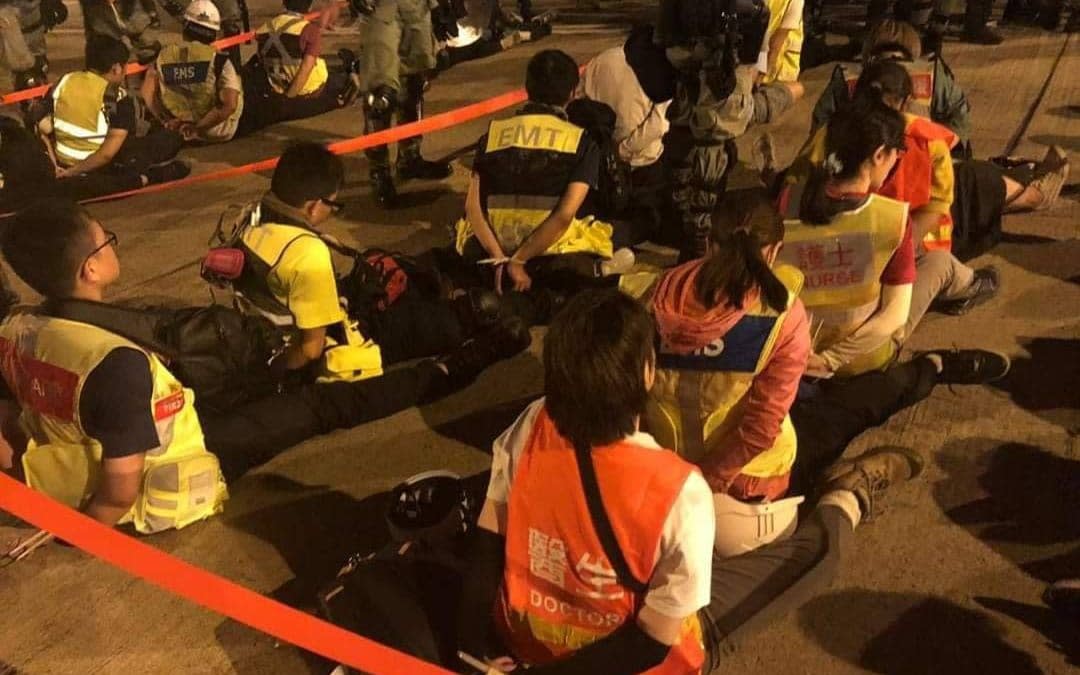Hong Kong medics accuse police of blocking emergency care to protesters

Leading Hong Kong medics have accused the police of violating international norms after emergency workers were detained and blocked from treating injured protesters during the violent siege of the city’s Polytechnic university last weekend.
Some 300 people were injured when riot police confronted protesters, with officers firing rounds of tear gas and rubber bullets and students responding with Molotov cocktails.
Volunteer medical teams provided emergency care to the injured but at least 16, clearly identified as doctors and nurses, were detained for taking part in a riot after police ordered everyone to clear the university complex by 10pm on Sunday.
A viral photograph of medical staff sitting on the ground, their hands bound behind their backs with zip-cords, caused outrage in Hong Kong.
“The actions of the Hong Kong Police Force have fallen far below accepted international norms for the handling of volunteer emergency medical providers. The arrest of these personnel is almost unheard of in civilised countries and is incompatible with the compact of humanitarianism,” wrote Darren Mann, a surgeon who attended the injured at the university in an article in medical journal, the Lancet.
“Furthermore, the chilling effect can only serve to deter would-be volunteers from offering their services in the much-needed medical care of injured people in this ongoing uncivil war,” he said.
Dr Mann further claimed that at least one doctor who was actively providing medical care to a casualty was arrested. In a press conference on Friday, he described the situation at the university as a “humanitarian crisis,” but he declined to comment on whether medical workers were being deliberately targeted by the police.
However, his anesthetist colleague, Vivian Jung, said that many first aiders – who voluntarily attend the protest frontlines to offer medical assistance – had been “threatened by police many times” and that attempts to negotiate with the police force over healthcare issues had failed.
Injured demonstrators were increasingly turning to a clandestine network of so-called “hidden clinics” for emergency treatment, she revealed.
“Nowadays, no protesters want to leave a trail of information in the public health system,” said Dr Jung.
A Hong Kong police spokesman said: "Police are aware of injuries inside PolyU which has been struck by recurrent violence. Police attach great importance to the situation and have arranged for ambulances to convey injured people to hospital for treatment.
"Police have made arrangement for volunteers such as Red Cross and Medecins Sans Frontieres to enter the PolyU. Some of the injured people have been conveyed to hospital if necessary. Police will assist the injured people who have left PolyU to receive treatment in hospital first before further investigation."
On Monday, the police said they had arrested 51 people who “claimed to be medics or journalists,” alleging that they did not have the correct credentials. This has been disputed by medical professionals.
The university on Friday remained surrounded by a tight police cordon, with dozens of protesters believed to still be inside.
Also on Friday, Hong Kong's High Court said it would temporarily suspend its ruling that found a controversial law banning protesters from wearing face masks is unconstitutional.
The court said it would suspend its ruling for seven days while appeals processes proceeded.

